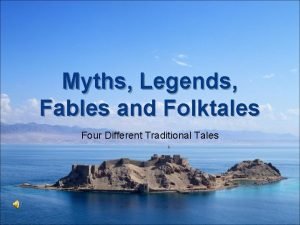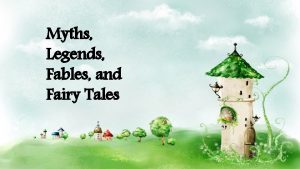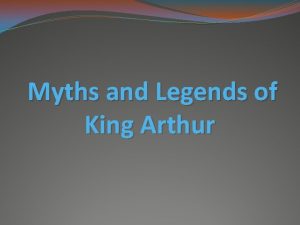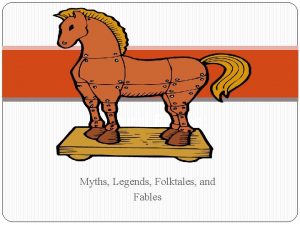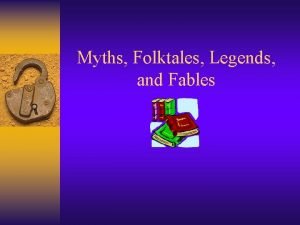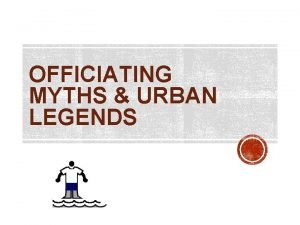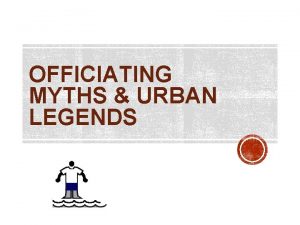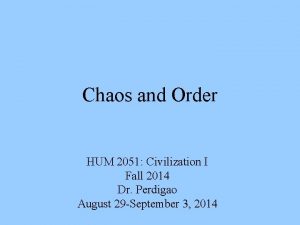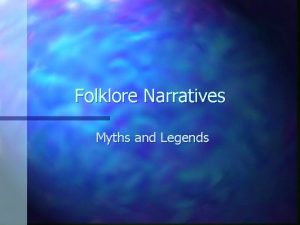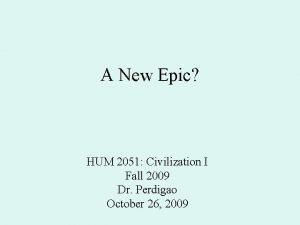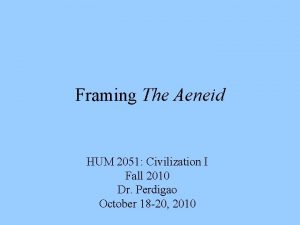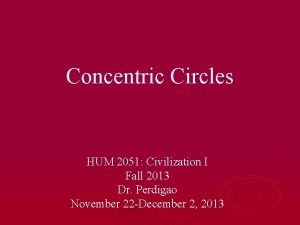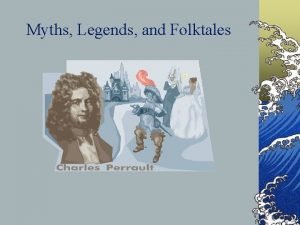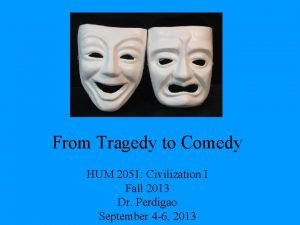Myths and Legends HUM 2051 Civilization I Fall










- Slides: 10

Myths and Legends HUM 2051: Civilization I Fall 2014 Dr. Perdigao October 20 -22, 2014

The Legacy • Founding of Rome in 753 BCE with mythological beginnings • Legend that it was founded by Romulus and Remus; abandoned, they were raised by she-wolf • 270 BCE—Roman lit began when Greek slave translated The Odyssey from Greek to Latin • Begins with translation—Greek imitation—essential to formation of Rome, Roman culture • Only 2 kinds of literature Romans excelled at: lyric and epic

Contextualizing Virgil • Virgil (70 BCE-19 BCE) • In spirit of imitation and respect but Romans also alter by enlargement (size and grandeur) • Inheritance, respect, but alteration by change • Virgil was a member of literary and social avant garde, goal to challenge government • His aim was to trace responses to government through literature (like Ovid and Catullus) but with new empire of Augustus • Chaos and order—order as the ascendancy of the power of Augustus

Constructing The Aeneid • Values: –Respect for the past –Personal subordinated for good of family/state –Intense reverence for authority –Stoic self-control (emotions held in check) • Virgil reimagines Homeric hero while at the same time honoring tradition of Homer’s epic and imitating it • Virgil spent 12 years on The Aeneid. At the time of his death, he wanted to write for three more years; when he was on his deathbed he told his friends to destroy it because he “hadn’t gotten it right yet. ” • But it is considered one of the most “perfected” works

Virgil’s Frames • As “eulogy” of Roman values (early reference to Fides and Vesta [939]), the cost at which they are achieved and sustained • Translation from prose to poetic form (not always complete hexameter lines) • After completing the poem, he tries to fix remaining lines but does not change chronological sequence

Virgil’s Tradition • Eclogues (37 BCE) as country vs. city life, pastorals • Georgics (29 BCE) as farmer-animal husbandry—practical compared to idealized country life in Eclogues • Politics of The Aeneid: idealization of central authoritative political power as best way to organize society • Beehives—symbol of Georgics—centralized authoritative figure, all subordinated to task for good of the hive • Beehive—as ideal community, Roman politics • As cautionary tale from the history of the Republic?

Structure and Form • The Aeneid—title • Imitates The Iliad—but names the character, combines 2 works • Invokes muse, begins in medias res, includes epic similes, Homeric epithets (pious Aeneas, dutiful Aeneas) • But the change is the focus on founding Rome rather than on personality of Aeneas • Issue of destiny—as action (unimaginable in Homer’s works) • Books 1 -6=wanderings of Aeneas from Troy, reflection of The Odyssey • Books 7 -12=battles of Aeneas and his troops, reflection of The Iliad

New Order • Aeneas’ epithet is “pious” while the Greek hero’s physical and intellectual traits are emphasized; Aeneas’ ethics, piety or devotion to his family, gods, and country are emphasized • Nostos=homecoming. . . Journey • Pietas=deep respect and reverence for one’s father, family, country, ancestors, and the gods • Augustus (Julius Caesar’s great-nephew, adopted son): rule=civic renewal of Rome, revival of traditional religious devotion, and the fostering of a new patriotism. The arts become important vehicles for the ideals reflected in Virgil’s work.

Comparison of Terms • Achilles and Odysseus are motivated by “obligation by personal gain and glory and display heroic wrath” while Aeneas is driven by obligation or duty (pietas) (Quartarone 202). • Juno’s wrath as motivation—like anger of Poseidon (Odyssey) and wrath of Achilles (Iliad); her anger over Dido and Carthage, injured honor (202) • Venus—Thetis (Iliad), Athena (Odyssey), as protectresses • Mercury intervenes to tell Aeneas that he must forsake personal glory and personal relationships (like/unlike when Hermes tells Odysseus that he must leave Calypso)

Close Readings • Opening lines, invocation to the muse, conceptual shift • “Is this / The palm for loyalty? This our power restored? ” (937) • Response: “fated things to come, ” the “gift of empire without end” (938). From mythical beginnings to reality • Dido’s story, betrayal, Sychaeus, Pygmalion • Venus’ treatment of Aeneas, disguise • Venus’ spell • Ascanius/Iulus • (“while Ilium stood”) • Stories retold, caution of Trojans emphasized



